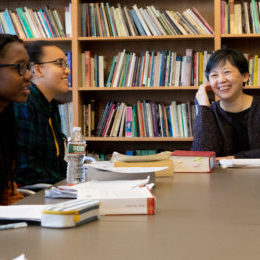This semester, I took my first fiction workshop in Princeton’s Creative Writing Program. I had taken two poetry courses in previous semesters and wanted to try something new. (Pro-tip: if you haven’t yet taken a CWR course, definitely consider applying for one before graduating).
Creative writing is, in many ways, a break from academic writing. It does not center on data, analysis, or argumentation. Instead, workshops focus on developing compelling images, characters, stories. Creative writing also has access to a wider variety of forms than academic writing, which tends to adhere to a narrow set of relatively conservative styles.

However, some of my workshop instructor’s writing advice has translated well to my academic writing. After all, writing is writing, and many of the same challenges confront both creative and academic writers. Below I’ve collected five of her best pieces of writing advice:
1. Writer’s block is just an excuse for procrastination. Runners don’t have runner’s block and scientists don’t have science block. Good writing does not emerge from miraculous waves of inspiration or creativity. Ultimately, writing is a task, a gradual skill requiring regular practice and effort. As with lab work and fitness, the writing process relies on a series of productive failures. The key is to keep doing it until you get results—even when you don’t feel particularly inspired.
2. To beat procrastination, picture your future misery if you don’t start now. It’s almost always easier to push a task off to tomorrow, or next week, or vacation. Generally, if I have the choice between doing something now or later, I privilege my now over my later. To overcome this trap, try imagining your life later if you avoid your work now. Actually visualizing your future stress may give you a much stronger motivation to get started.
3. Characters don’t change, they become more themselves. While academic writing tends not to invent characters, a similar logic applies to scholarly arguments. Arguments don’t change—they evolve. We have to trust that our early writing ideas contain the beginnings of complex and developed arguments. At the same time, we also have to allow our arguments to lead us where they want to go, rather than forcing the data into our original vision.
4. Writing with a reader in mind can be more restrictive than it’s worth. Of course, we can’t totally disregard our reader in academic writing—especially when that reader is our professor or grader. Nevertheless, it can be liberating to disregard reader expectations, even temporarily. Writing for yourself can produce much stronger and more interesting work than writing for an imagined reader. When I started my first thesis draft, I spent many hours struggling to catch my reader up on what felt like necessary background information. After completing the chapter, I ended up deleting this entire section. Trying to meet the reader’s hypothetical needs distracted from the actual content of my chapter. My time would have been much better spent focusing on my own ideas from the get-go.
5. Don’t write about what you know; write about what you don’t (yet) understand. When choosing a research topic, it can be easy to choose a comfortable or familiar subject—something covered heavily in class or something you studied in a previous course. However, choosing a topic rooted in your own interests—independent of the course’s content—will produce much stronger results, and will be exponentially more enjoyable to write. I recently experimented with this in an Urban Studies course focused on New York and Moscow. Over the summer, I began learning about the onset of the American AIDS epidemic and knew I wanted to keep reading about it. Unfortunately, no classes on the subject were offered this semester and my thesis adviser counselled against incorporating it into my thesis. Instead, she suggested I continue researching it through one of my existing courses. Even though my Urban Studies course barely mentioned AIDS or LGBTQ+ history, I decided to focus all of my assignments for the course on the epidemic. I cleared the idea with my professors beforehand and, as it turns out, it wasn’t hard at all to build my papers around the topic. In retrospect, my papers for that course were some of the best I’ve ever written—I cared deeply about this still unfamiliar topic and (I think) it showed.
I hope my instructor’s writing advice helps guide us through a relatively calm and inspired reading week. Happy Dean’s Date!
–Rafi Lehmann, Humanities Correspondent

